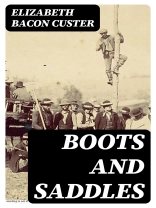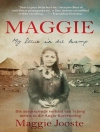In ‚Boots and Saddles, ‚ Elizabeth Bacon Custer crafts a vivid memoir that chronicles her experiences as the wife of George Armstrong Custer, a controversial figure in American history. Written in a lyrical yet straightforward style, the book is infused with rich descriptions of military life, the American frontier, and the complexities of gender roles during the late 19th century. Custer’s narrative not only recounts her life alongside her husband but also captures the ethos of an era marked by both exploration and conflict, providing insights into the societal expectations placed upon women during a time of upheaval. Elizabeth Bacon Custer was deeply influenced by her upbringing and the tumultuous historical context in which she lived. Born in 1842 in a prominent family in Monroe, Michigan, her education and personal experiences within military circles allowed her to gain unique perspectives on the events surrounding the Indian Wars. Her close relationship with her husband profoundly shaped her understanding of his actions, both controversial and heroic, providing a lens through which readers can explore historical narratives that are often dominated by male perspectives. This book is highly recommended for readers interested in American history, women’s studies, and military life. Custer’s eloquent prose and personal anecdotes illuminate the psychological and social challenges faced by women in the 19th century, making ‚Boots and Saddles‘ a compelling read that broadens our understanding of a pivotal time in American history.
Über den Autor
Elizabeth Bacon Custer (1842–1933) was a prominent American author and public speaker, best known for her intimate portrayals of military life on the American frontier during the latter half of the 19th century. The widow of General George Armstrong Custer, Mrs. Custer became a literary advocate of her late husband’s legacy. In her emotionally charged narrative ‚Boots and Saddles: Life in Dakota with General Custer‘ (1885), she vividly chronicles the daily challenges and adventures she experienced while accompanying her husband at his various army postings. Written with a keen eye for detail and a deep sense of personal reflection, Elizabeth Custer’s work provided a rare and valuable woman’s perspective on the otherwise male-dominated accounts of military and pioneer life during the period. Her literary style seamlessly combines the elements of personal memoir with historical insight, rendering her accounts both deeply personal and valuable to historians. Elizabeth Custer’s literary contributions are not only limited to this poignant memoir, as she wrote other books and articles, but ‚Boots and Saddles‘ remains her most enduring and celebrated work, offering readers a window into the frontier past and the indomitable spirit that inhabited it.












